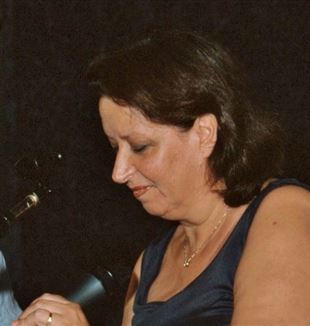
At the Meeting "the choir sings Adriana"
In Rimini, an evening dedicated to Adriana Mascagni, a few months after her passing. To tell of that "encounter that has marked our lives".In 2001 the Rimini Meeting took chose some lyrics from the famous son Povera voce, a song that Adriana Mascagni wrote with Maretta Campi, as the title of the twenty-second edition: "All life asks for eternity." On that occasion, in a dialogue before the Rimini audience with poet Davide Rondoni, Mascagni explained what singing was for her: "It is the voice of the Mystery. It is the Mystery itself singing. Song is already there. What is up to us is the enchantment that it arouses in us, and it depends on the ability to listen to this song and give it back to everyone, to interpret it; to sing is to listen. Song is encountering the Mystery, to encounter the Other, every encounter with every other that is a sign of that Other. This is what fascinates me about singing."
Adriana, who passed away on December 22, was a singer and author. For 25 years she directed the GS Choir in Milan. Prior to that 2001, she had been featured in previous editions of the Meeting: in 1982, the year Pope John Paul II came, she performed in a concert entitled "Canto a Maria," and three years later she returned with the concert "Ecce Homo." In 1989 she dialogued with Franco Mussidda, guitarist, songwriter, composer and founder of Premiata Forneria Marconi, one of the most important groups of progressive rock even beyond Italy. This year the Meeting will remember her with a special performance, entitled "The Choir Sings Adriana." She did not consider the songs she composed as “hers”, but everyone's, because singing together with a why is the highest pinnacle of friendship. On the evening of August 22 therefore, the Rimini Meeting will not host a concert "in memory," but will offer the opportunity to encounter the other through Mascagni's songs.
The evening will feature not only her most important songs, which have accompanied the history of GS and CL from the beginning, becoming a common history, such as Povera voce, Al mattino, Il mio volto, but also the latest and lesser-known songs (La nebbia, Amica del Mistero and others), along with the polyphonic songs (e.g. Sometimes, Tristis Est, Ave Verum) that she loved to teach in preparation for the GS Triduums, the Via Crucis, and gatherings. On the Auditorium stage, 80 singers of various generations (ages 15 to 60) who grew up in "Adriana's choir," will perform, now directed by Francesco Mauro. The songs will be interspersed with the reading of short texts and projected images of her story. As a sign of this "inexhaustible friendship," some songs may be sung by all those present.
"On the day of Adriana's funeral," Francesco Mauro wrote in his letter of invitation to the singers, "we had the opportunity to see what the presence of Christ has generated and generates in our history: a friendship that is close to you until death, in a carnal and real way. For some of us this friendship came precisely through singing together, grew and developed from serving the movement in song. In those days it became clear that Adriana's contribution to our experience cannot be confined to the songs, however beautiful, that she wrote or that she introduced us to, but goes far beyond them. Her way of hearing the songs and conducting, the total coincidence between herself and what she sang or conducted, the question that flowed from the heart in suffering and joy, the joy of the encounter: these are the things that won us over and contributed to our discovery of Fr. Giussani's charism. In this sense, it was the encounter with Adriana that has marked our lives."
Read also - Meeting 2023: The shows
Two new releases will also be launched at the Meeting: a book and a CD on Adriana. The book, Amica del Mistero [Friend of the mystery], is edited by Mascagni's children, Giovanni and Giuditta Zola, and collects numerous testimonies (among others by Guido Clericetti, Peppino Zola, Monsignor Massimo Camisasca, and Davide Prosperi), the texts – some previously unpublished ¬– introducing her songs, and the scores of all the songs she composed. The CD is entitled Adriana Mascagni - Her Songs.